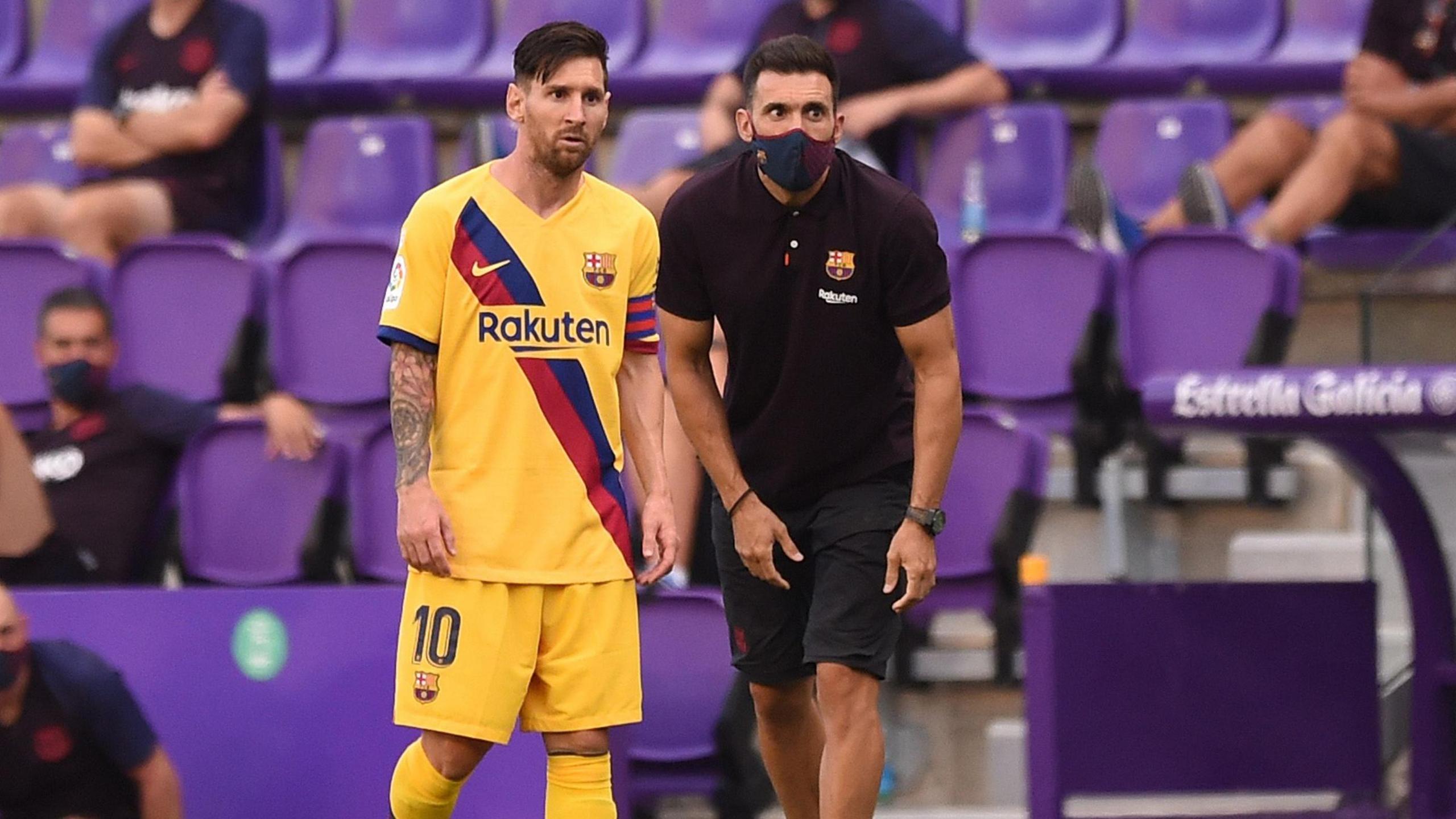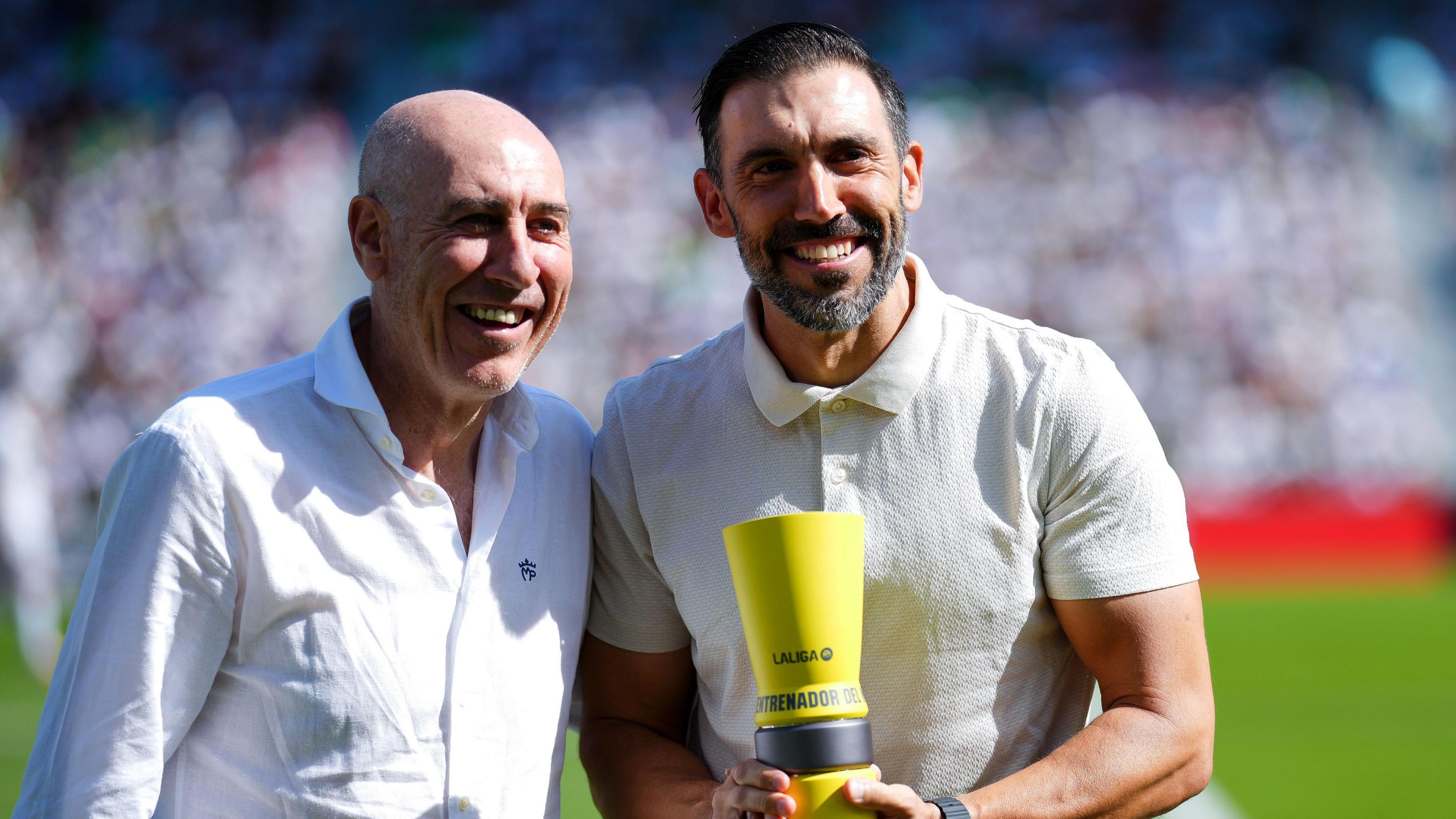
After two years away from Spain’s top division, Elche achieved their automatic promotion back to La Liga with an impressive 4-0 victory at Deportivo in June.
Being the third biggest city in the Comunidad Valenciana and the 20th largest in all of Spain, Elche cannot truly be viewed as one of those teams analysts like to label as «punching above their weight».
Nevertheless, that did not prevent many analysts from assigning them the questionable title of being – alongside Real Oviedo – the most likely to immediately fall back into the second division.
So far, that has proven incorrect. With over a quarter of the season completed, Eder Sarabia’s squad heads into Sunday’s match against Barcelona in eighth place in La Liga after ten matches – recording three wins, five draws, and only two losses.
This will be an emotional day for the Bilbao-born manager, who is returning to the Catalan team for the first time since a notable seven-and-a-half month term as assistant to Quique Setien in 2020.
I met with Sarabia to discuss his lackluster playing career, his renowned father, and his comeback to La Liga.
What do we know about Eder Sarabia?
They say the apple doesn’t fall far from the tree, but in Eder Sarabia’s situation, the abilities he inherited differed from those of his father Manu.
Manu is revered at his cherished Athletic Club, having captured consecutive titles from 1982 to 1984, including a league and cup double in the 1983-84 season.
Eder never approached matching his father’s footballing talent and never played above the third division – although it wasn’t due to a lack of effort.
«I believed I would become a footballer, but it didn’t pan out,» he reflects. «I ended up as an amateur – I began coaching and found satisfaction from the outset. I have continued on this path and I’m very content.
«My parents worried that not achieving that dream might traumatize me, but they were relieved to see that coaching fit me well.»
Nonetheless, it wasn’t entirely smooth sailing when it became apparent he would not reach the competitive heights his father did.
For this, he credits his mother – who encouraged him to pursue engineering instead of what might have seemed a more suitable path of physical education.
«We never lacked for anything, but when I wanted to buy a car, I had to work hard to earn it,» he shares.
«When I wished to pursue a master’s degree after completing engineering, my parents insisted I find employment.»
This led him to a position at a supermarket in Bilbao, initially as a stock clerk and then managing the fruit section.
Reflecting on that period, he remarks: «It’s all about appreciating things, understanding their true value, and gaining wisdom from your experiences in life.»
How did he arrive at Elche?
Sarabia concluded his playing days at merely 24 years old, recognizing deep down he couldn’t achieve the aspirations he once held.
He then began mentoring youth at Cruces, subsequently moving to the youth division of Danok Bat – one of the principal feeder clubs in the Basque Country that nurtures players for local senior teams.
In 2011, Sarabia transitioned to Villarreal, and after several roles with different youth teams, he was appointed manager of their C team in October 2013.
A pivotal moment for his growth was his encounter with Setien – the person with whom he would collaborate for five years and who played alongside Sarabia senior at Logrones.
The influence Setien had on young Sarabia was significant.
«My father and Quique were my two footballing fathers,» he mentions.
«I met Quique when I was eight, and he was probably my father’s closest friend in football, so we shared a strong bond for a long time.»
While at Villarreal, he maintained communication with Setien – who was coaching at Lugo – offering suggestions on enhancing the team’s performance.
Setien, in return, had observed Sarabia’s Villarreal youth squad in action, appreciated their play, and promised him a position whenever he departed the Galician club.
True to his word, when Setien joined Las Palmas in October 2015, one of his first calls was to Sarabia, offering him the role of assistant.
When Setien was contacted by Real Betis 17 months later – and again by Barcelona in January 2020 – Sarabia accompanied him on both instances.
A ‘learning curve’ at Barcelona

During his time at a Lionel Messi-led Barcelona, Sarabia learned firsthand what it felt like to be outside his comfort zone.
Often cited by the press as a key factor in a rift between the players and the coaching staff, particularly notable during a match against Celta Vigo when Messi was seen ignoring him, he later acknowledged a conflict between the squad and the staff after that game.
However, these days he speaks positively about his experience with the Blaugrana – and especially about Messi.
He reflects on the Argentine genius: «Leo is not only the greatest ever – he’s likely the one who comprehends [football] better than anyone else. He understood the game incredibly well.
«He’s a tremendous competitor. He would get upset if anyone criticized his team during training or if they lost, and we had our share of challenges.
«But he wanted to improve and for the team to excel, seeking the greater good because he aspired to keep winning. He held the dream of claiming another Champions League.»
Setien was dismissed seven months after Sarabia’s arrival, and while his tenure at Barcelona was brief, he views it as a «learning curve».
‘I aim to leave a legacy’

Following three seasons with Gerard Pique’s FC Andorra, Eder joined Elche in the second tier on an initial one-year contract.
The team secured promotion back to La Liga after a two-year absence, which resulted in him receiving a contract extension until June 2027.
Despite a recent rough patch in which his squad has lost two and drawn one of their last three matches, Sarabia’s Elche team has demonstrated that their creative, adaptable, and attacking approach should more than suffice to avoid relegation.
Some promoted teams tend to adopt a defensive mindset in survival mode instead of being proactive. However, that won’t be the case for Elche.
If they find themselves relegated – which currently seems unlikely – at least they will do so fighting, staying true to Sarabia’s philosophy: delighting supporters.
He states: «We have an overarching vision and a framework, yet we never play identically.»
Central to his beliefs is an unwavering expectation that players compete with integrity.
He elaborates: «In Basque, there’s a term ‘jatorra’. There isn’t a direct translation, but it means being a good person, honest, and doing things the right way.
«Winning is not everything at any cost – that’s a principle my father taught me – football is for intelligent individuals, not for those who cheat.»
Sarabia believes that football should encompass more than mere results, victories, or transfer market activity – it should also prioritize the welfare of the institution.
«I focus on the club’s advancement in both the near and distant future,» he shares.
«If I stay for a lifetime, fantastic, but if it’s only six months or three years, I wish to leave a mark so that the club can continue to develop and enhance.»
Related topics
- Spanish La Liga
- European Football
- Football
-
Listen to the latest Football Daily podcast








